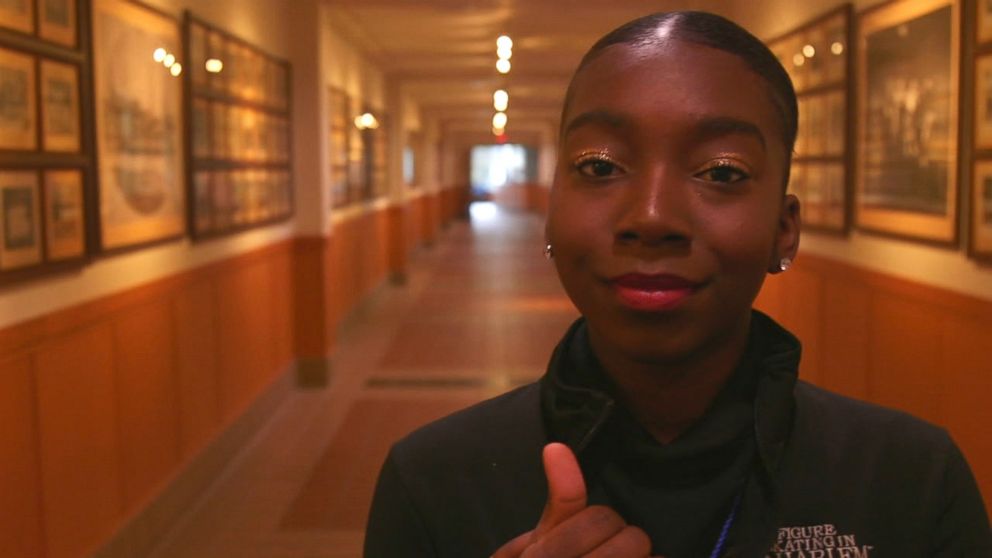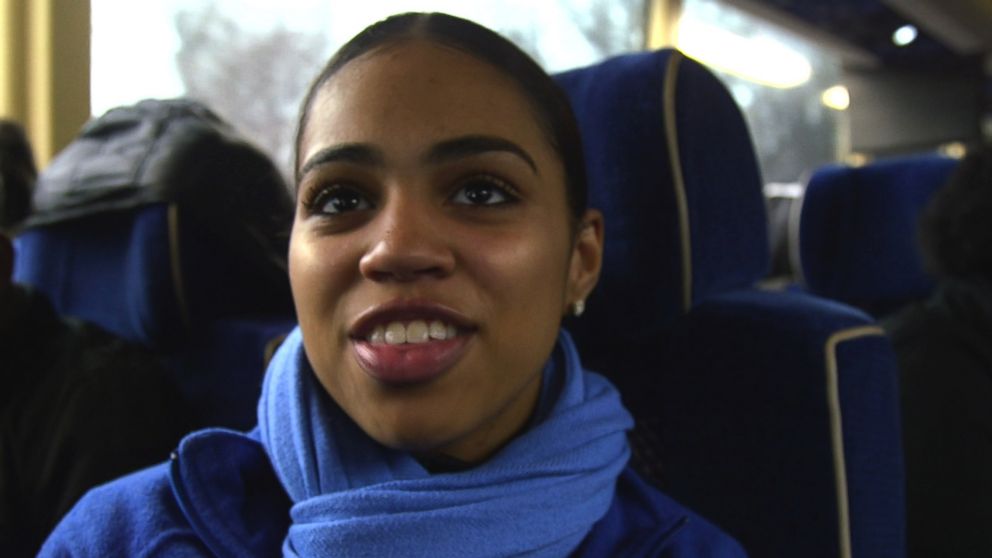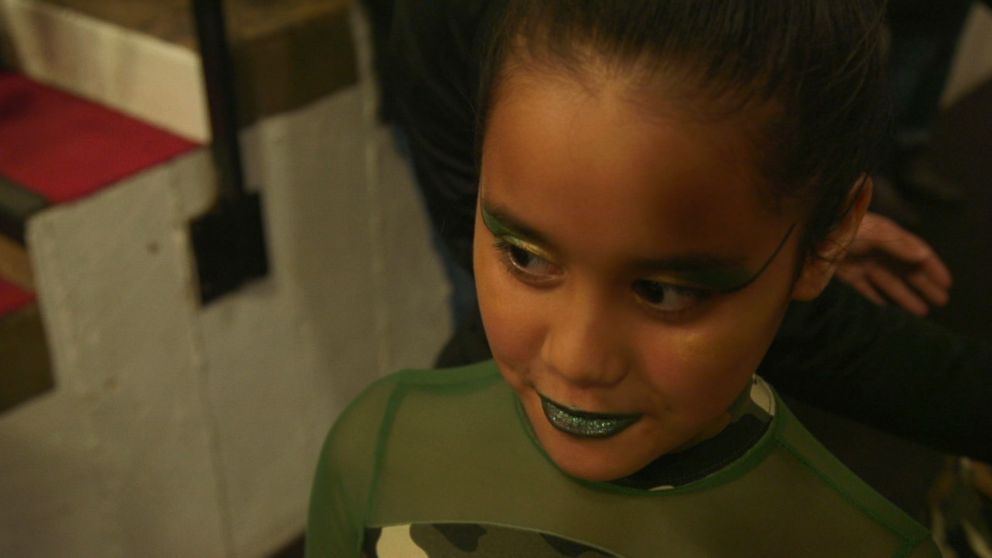For these young women of color, ice skating helps fight discrimination
For these young women of color, ice skating helps fight discrimination.
Ila Epperson had always grappled with her identity. Adopted when she was a baby, the 15-year-old said she struggled to figure out who she was and what kind of woman she wanted to be.
“Everybody goes through a struggle of not knowing who they are but a big part of it is knowing where you come from and not being able to put two and two together,” Epperson told ABC News' “Nightline.”
She found answers in an unlikely haven -- the ice rink. The Harlem, New York-native has ice-skated since she was 6.
“I don't have to explain myself when I'm skating,” Epperson said. “It just kind of guided me in the right direction. This is who I am. This is what I want to do and this is what I have to do to get there.”

Epperson and her best friend, Destiny Jean-Michel, are part of Figure Skating in Harlem, a program dedicated to providing educational mentorship and access to the elite sport to black and Latina girls, an underrepresented demographic in sports. It’s a fact of which Epperson is acutely aware.
“Diversity is something that is not seen enough everywhere,” she said. “Like when was the last time you had a black person in the Olympics?”
She is not far off the mark. At this year’s Winter Olympics, Team USA was at its most diverse ever but nonetheless was 92 percent white.
As one of the only teams in the country comprising of girls of color, the Figure Skating in Harlem skaters said they often face discrimination.
“Race is in everything,” said Epperson describing an incident in which another team made snide comments about ensuring the girls “don’t take their bags.”
It was admittedly intimidating for the girls, at first. But with each toe jump, every axel, their confidence grew.
“It was definitely intimidating but then I realized that there is nothing intimidating about it, it's just actually inspiring and empowering to be the only girls of color,” said Jean-Michael.
‘Champions for life’
Sharon Cohen, the founder of Figure Skating Harlem, believes it’s more vital than ever that girls of color have all the opportunities to become who they want to. Her motto? “We are not training girls for the Olympics, we are creating champions for life.”
Cohen founded the program in 1997 after being exposed to a black hockey team in East Harlem.
“I was completely struck by it. I thought it was amazing because in my time in skating I never saw kids of color,” Cohen told ABC News’ Linsey Davis. She soon began teaching girls in East Harlem to skate before formally creating the organization.
Once a competitive skater herself, Cohen is a national gold medalist who knows all too well the exclusivity of the sport.
“The palette of figure skating doesn’t look a whole lot different today than it did back when I skated,” she said.
Cohen said that though ice skating gets all the publicity, the heart of the program extends beyond the ice -- girls take classes in science and technology twice a week as well as lessons in leadership. The program boasts that 100 percent of their students pursue higher education.
“Our big wins are when our girls go on to schools like Georgetown and Barnard, Howard and Spelman,” Cohen said.
Changing lives
For Destiny Jean-Michel’s dad, Cliff Jean-Michel, the program has no parallel. He’s ubiquitous at competitions, often seen sitting, munching on snacks in stands.
“When Destiny skates, it’s like she’s this different person on the ice. It’s like there’s off-ice Destiny and there’s on-ice Destiny -- and her face just glows and blossoms,” he said.
He’s a single father, raising Destiny on his own after Destiny’s mother left the household years ago. He credits the sport with changing his daughter’s life. One afternoon before he takes his daughter to practice, he stops for a moment, picking up a picture of Destiny on the ice. A tear comes to his eye.
“[I’m] just thinking about what she has been through in life and how this moment in pure and innocent,” he said.

“He raised me by himself,” said Destiny, who never had a female role model growing up. “Once I came to Figure Skating Harlem, I got sisters,” she added.
And it’s not just emotional support. Skating is an expensive sport that can cost up to $50,000 a year for gear and coaching. Figure Skating Harlem is partially funded through charitable donations, which subsidize the girls’ costs. Destiny's family pays about $850 annually for skating, including outfits and private sessions. Figure Skating Harlem also helped her get a full scholarship to a top-tier private prep school in New York.
“We struggle with money here and there but we manage and cope,” she said. “Figure Skating Harlem definitely helps me doing something I love.”
Expanding to other cities
The success in Harlem inspired Cohen to expand the program to Detroit, a city struggling with education reform.
“It is a community in need,” said Cohen. “In need of educational support as well as leadership that comes with figure skating.”
Once a manufacturing hub, Detroit declared bankruptcy five years ago. The schools have continued to lag behind, with many of them shutting down. Figure Skating Detroit Director Geneva Williams said the city is poised for a comeback.
“Detroit, we're in the midst of a terrific wonderful transformation. We're going to be bigger and better than we've ever been before,” Williams said. “To have attention focused on developing young women because it's all about girl power -- this is a place to have that happen.”

For 8-year-old Janiya Johnson and her mother, Janeen Johnson, the news of Figure Skating Harlem coming to their city ushered big dreams.
Janiya not only wants to make it to the Olympics, she wants to become a legend.
“We are black women and we can do anything that other people can do,” she said. “We are strong, just like other people.”
Watch the full story on "Nightline" TONIGHT at 12:35 a.m. ET



